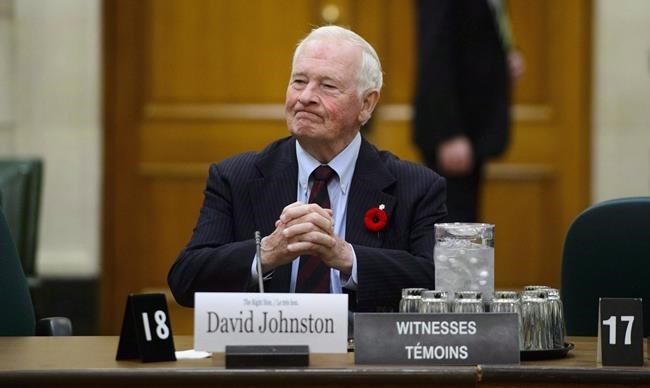OTTAWA — Special rapporteur David Johnston said Tuesday that a formal inquiry into foreign interference is not needed, that public hearings should be held as part of his own mandate.
Johnston said an inquiry could not be undertaken in public because of the sensitivity of the intelligence involved, and formal subpoena powers are not required for him to hold his own hearings with diaspora communities, academics and political stakeholders.
The former governor general's initial report into foreign interference allegations found serious issues in how intelligence from security agencies was communicated to government but didn't identify any instances where the prime minister negligently failed to act on intelligence, advice or recommendations.
Prime Minister Justin Trudeau asked Johnston in March to lead an investigation into the extent and impact of foreign interference in Canada, amid allegations that China meddled in the last two federal elections.
"There are serious shortcomings in the way intelligence is communicated and processed from security agencies through to government, but no examples have been identified of ministers, the prime minister or their offices knowingly or negligently failing to act on intelligence, advice or recommendations," Johnston's report said.
It said there is a “lack of accountability” about who is receiving what intelligence, a situation that is not acceptable given the current threat environment.
Johnston's report also concluded, based on access to classified documents and security agencies, that specific accusations of interference that have dominated the political conversation were less concerning than media reports suggested.
"When viewed in full context with all of the relevant intelligence, several leaked materials that raised legitimate questions turn out to have been misconstrued in some media reports, presumably because of the lack of this context," it said, pointing to reports from Global News and the Globe and Mail that have dominated the political conversation around interference.
Johnston said an inquiry digging into the allegations would have to take place almost entirely behind closed doors.
"That would defeat its primary purpose, which is public accountability through transparency," the report said, adding the public process should "focus on strengthening Canada’s capacity to detect, deter and counter foreign interference in our elections and the threat such interference represents to our democracy."
The report warned that excessive partisanship in the way the issue is discussed is making the country more vulnerable to external threats.
"There has been too much posturing, and ignoring facts in favour of slogans, from all parties. And many of those slogans turned out to be wrong."
Johnston’s work is expected to continue through the end of October, when he is due to present a final report to the government.
This report by The Canadian Press was first published May 23, 2023.
The Canadian Press
